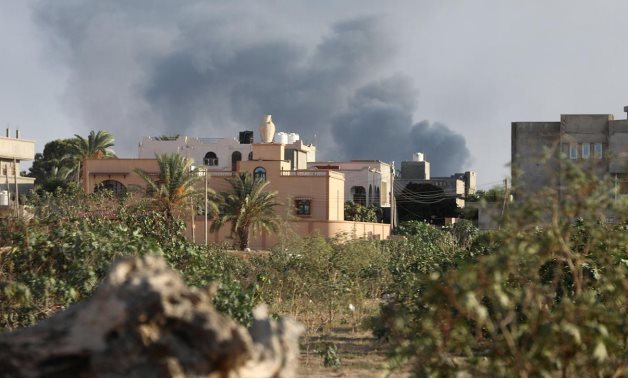
Smoke rises during heavy clashes between rival factions in Tripoli, Libya, August 28, 2018. Picture taken August 28, 2018. REUTERS/Hani Amara
CAIRO - 16 September 2020: The UN Security Council renewed UNSMIL’s mandate in Libya for another year through Resolution 2542 (2020).
The UN Security Council extend the mandate of its integrated special political mission in Libya, listing a range of mediation and good offices tasks, while also charging the Secretary-General with conducting an independent review of its structure, priorities, and staffing effectiveness.
Adopting resolution 2542 (2020) by a vote of 13 in favor to 0 against with 2 abstentions (China, Russian Federation), the Council decided to extend until 15 September 2021 the mandate of the United Nations Support Mission in Libya (UNSMIL) as an integrated special political mission.
It outlined tasks to be conducted in full accordance with the principles of national ownership, including furthering the implementation of the (2015 Skhirat) Libyan Political Agreement; supporting efforts by the (Faiez Serraj) Government of National Accord to stabilize post-conflict zones; monitoring and reporting violations of human rights and humanitarian law; and providing support to Libya, upon request, in response to the COVID-19 pandemic. The Mission will also be charged with helping to achieve a ceasefire and, once it is agreed by the Libyan parties, providing appropriate support to its implementation.
Security Council members also decided that UNSMIL should be led by a Special Envoy of the Secretary-General with a focus on good offices and that, under the latter’s authority, a UNSMIL Coordinator will be in charge of the Mission’s day-to-day operations and management. Among other things, they requested the Secretary-General to assess the steps required to reach a lasting ceasefire in Libya — as well as UNSMIL’s possible role in providing scalable ceasefire support — to be submitted no later than 60 days after the adoption of the present resolution and asked him to appoint his Special Envoy without delay.
The Security Council further requested the Secretary-General, in accordance with best practices, to conduct and submit a strategic review of UNSMIL no later than 31 July 2021. That review should include an assessment and recommendations for improving the efficiency of UNSMIL’s overall structure, prioritization of tasks, and the capacity and effectiveness of staffing, including on mediation and peace process management; as well as an assessment of options for effective ceasefire monitoring under the auspices of the United Nations, including additional recommendations as necessary.
In addition, Security Council members requested the Secretary-General to include, in his regular reporting on the situation in Libya, United Nations efforts to address the coronavirus and the pandemic’s impact on the ability of UNSMIL to deliver on its mandated tasks.
Speaking in explanation of position, the representative of South Africa said his delegation voted in favor of the resolution as there can be no military solution to the conflict in Libya. All parties must commit to a political dialogue, he stressed, noting the African Union’s concern with the continued stalemate in that regard. He welcomed cooperation between his bloc and the United Nations, as well as strong support from neighboring countries, and praised the start of talks now being hosted by Morocco that will hopefully lead to lasting peace in Libya.
The representative of Viet Nam said his delegation also voted in favor of the text, underlining that the only path forward is an inclusive, Libyan-led and Libyan-owned political process. He joined other speakers in spotlighting the crucial role of regional actors and welcoming the launch of the intra-Libyan dialogue in Morocco.
The representative of the Russian Federation, noting that his delegation abstained in the vote, said not all its views were reflected in the draft resolution. “It is only Libyans themselves that must determine the future of the country,” he stressed, adding that any ceasefire monitoring support must be carried out with the agreement of the Government. He hoped that a Special Envoy and a Head of UNSMIL will be appointed “in the very near future”.
China’s representative said that, despite recent progress, the situation in Libya remains fragile. He expressed regret that several elements in today’s resolution — especially those related to human rights, gender, and ceasefire monitoring — were not properly agreed upon by all Council members. Any future ceasefire monitoring arrangements must be agreed by all the parties concerned, he stressed, adding that the concerns of all Council members must be heeded in future negotiations.
The representative of Indonesia said today’s text translates to “no more fighting, no more foreign intervention” and provides the flexibility necessary for UNSMIL to support a ceasefire and protect Libya’s people. He agreed with other speakers that it is time to appoint a Special Representative, adding: “Let us continue the momentum and move forward towards a lasting peace.”
The representative of the United Kingdom expressed surprise that two delegations had chosen to abstain in today’s vote, recalling that, as the resolution’s drafter, his delegation was quick to address all concerns raised. The language referenced by the Russian Federation regarding ceasefire monitoring arrangements makes clear that consultation among all parties is required.
Several references to human rights and gender were removed during the drafting process in response to China’s concerns, but others were left in the text as a compromise solution. He expressed hope that all Council members will support the soon-to-be-appointed Special Envoy to help bring about much-needed peace in Libya.
The representative of Tunisia joined other speakers in expressing his thanks to the penholder and welcoming the text’s adoption, which his delegation supported.
Comments
Leave a Comment